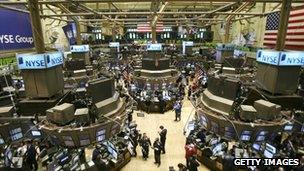MF Global: Another coalmine canary?
- Published
- comments

The good news is that MF Global isn't big enough or connected enough for its collapse to risk serious damage to the financial system.
It is a medium size broker, with a leading position in futures, which was in the process of being turned into a mini Goldman Sachs by its prominent chairman, Jon Corzine - who, as it happens, was chairman of Goldman for much of the 1990s (before a foray into US politics as the Democrat governor of New Jersey).
With gross assets of about $40bn, MF Global's lurch into bankruptcy protection under America's Chapter 11 legislation will keep a few bankruptcy lawyers and accountants gainfully employed for some time.
But there should not be a domino effect of other bankruptcies.
There is bad news, of course, which is that it and Dexia - the Franco Belgian bank that has had to be rescued by taxpayers in Belgium and France - are beginning to look like canaries in a life-imperilling coalmine.
What they have in common is heavy reliance on short-term wholesale finance and big loans to eurozone governments whose debts are seen to be excessive.
MF Global disclosed last week that it has a "net long position of $6.3bn in a short-duration European sovereign portfolio…including Belgium, Italy, Spain, Portugal and Ireland".
Or to put it another way, it had lent a sum that is equivalent to five times the value of the equity capital it holds as protection against potential losses to governments whose ability to repay all they owe is moot.
Unsurprisingly the hedge funds, professional investors and banks that lend to MF Global or have funds on deposit with MF Global decided there might be safer and sounder places to lodge their cash.
When that happens, when a financial firm's creditors want their money back, it's cheerio, adieu and goodnight - unless, that is, a friendly central bank is prepared to bail out said firm.
MF Global is not the kind of financial institution that the US Federal Reserve or the European Central Bank feels minded to prop up with emergency loans.
Which is simply a reminder that a number of other European banks would be pushing up the daisies by now, if the ECB had not felt minded to keep them on life support, for the putative health of the eurozone economy.